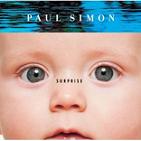 There comes a time in every musical artist or band’s life when he, she, or they recognize the superior majesty of another being and succumb to his control. I refer, of course, to the superiority of sound engineer Brian Eno, who has cast his spell in the past over Talking Heads, U2, and David Bowie, among others. That moment of surrender has now happened to Paul Simon.
There comes a time in every musical artist or band’s life when he, she, or they recognize the superior majesty of another being and succumb to his control. I refer, of course, to the superiority of sound engineer Brian Eno, who has cast his spell in the past over Talking Heads, U2, and David Bowie, among others. That moment of surrender has now happened to Paul Simon.
Simon’s new album, “Surprise,” can’t really be called a collaboration between Eno and Simon, since the songwriter’s restless patter and wondering voice are too intimately recognizable. But there are moments where Eno’s skein of background sound seems to levitate the usually solidly earthbound Simon into a more transcendent musical place.
Which is entirely suitable to what is Simon’s most openly transcendent album. He has spoken in earlier songs of living in “an age of miracles and wonder,” but awe is not the prevailing spirit of the new album. “Surprise,” which has the wide-awake face of a baby on its cover, is the work of a man looking back on a life mostly lived, one who claims to be tired. “Who’s gonna love you when your looks are gone?” Simon asks in the song “Outrageous.” And he is thinking not only of his dotage, but beyond. Since his days with Art Garfunkel, Simon has sung about how to live rightly within situations (like the world, we are meant to understand) that are inherently morally compromised. Drug dealers, lovelorn misfits, bad kids on the lam, broken-down boxers have all spoken through Simon’s voice. On “Surprise,” they all seem to show up looking for peace at the end. “I want to rid my heart of envy, and cleanse my soul of rage before I’m through,” he sings in “Wartime Prayers.”
There is some direct discussion of religion on the album, much of it championing a liberal Democrat’s view of the Higher Power. The opening track reduces the notion of individual religions, sects, or denominations to a matter of regionalism. The song’s title, “How Can You Live in the Northeast?” is followed by a list of questions, including “How can you be a Christian? How can you be a Jew? How can you be a Muslim, a Buddhist, a Hindu?” and follows this by asking, “If the answer is infinite light, why do we sleep in the dark?” A bout of conscience, Simon sings, “sure don’t feel like love.” It sounds more like low self-esteem.
But the surprise of the album—the surprise for all of his characters and for all of us–is that God does exist, and Simon’s not afraid to say it. To his question in “Outrageous”–Who’s gonna love you when your looks are gone?”–he answers simply, “God will.” Even in “I Don’t Believe,” in which the speaker doubts whether even kindness is anything more than a fairy tale, he ends with a plea that one’s love not be “all that there is or could ever exist.”
In a time when even churchmen urge us to approach faith from a place of doubt, Simon approaches doubt from the point of view of faith.


